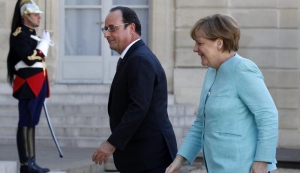Grexit Would Trigger a Major Political Crisis for the EU
Dr Paola Subacchi
Research Director, International Economics
The dust hasn’t yet settled on the outcome of the Greek referendum and Europe’s future depends on the willingness to find a solution to what seems an unsolvable problem: giving Greece some debt relief on the basis that its debt is unsustainable (as shown in the IMF’s Debt Sustainability Analysis) without creating a huge case of moral hazard and political tensions.
Outside Europe, the Greek saga surely looks incomprehensible, not to say absurd: How can a country with a nominal GDP of a bit less than €180 billion – approximately the size of British Columbia – threaten an economic bloc with 500 million people and an economy larger than China’s?
And yet, through financial and political interdependencies, Greece’s fate cannot be delinked from that of Europe’s monetary union – the bloc of countries that share the euro as a common currency – and even from the European Union itself.
Shifting narrative
Compared with 2012, when Greece’s second bailout was agreed, the risk of financial contagion to other euro zone countries, in the event that Greece decides to leave the currency union, should be limited. Now, it is the official sectors – ultimately, other countries’ governments – to be exposed to the Greek debt, rather than German, French and Italian banks, as was the case in 2012. And now there is the firewall put up by the European Central Bank (ECB) to protect vulnerable countries from speculative attacks.
The notion that the euro zone won’t go through a massive financial turmoil and the relatively muted market response so far have emboldened the creditors. Despite the outcome of the referendum, Athens remains in a weak position. The country is now in a deep liquidity crisis and the banks have not yet reopened. Thus, the provision of cash from the ECB’s Emergency Liquidity Assistance – at €89 billion – remains a powerful mechanism for keeping the Greek government engaged in discussions.
But the exasperation of the other euro zone member states is palpable. The thread that links Greece to Europe has never been so thin, and a Grexit scenario is now openly discussed in Brussels and Frankfurt.
The narrative of the crisis has clearly shifted, and this has changed the negotiating tactic. With the fear of financial contagion considerably diminished, the creditors’ anodyne language is out; deadlines and conditions are in. The ball is now in the Greek authorities’ court to give substance and credibility to their request for a three-year bailout program. The creditors need to be seen to be tough, and are not in the position to make significant concessions. A plan needs to look thorough enough to be acceptable to voters in the creditor countries.
The reality on the ground is much less conspiratorial and more mundane than has been suggested by the Greek rhetoric of a neoliberal coup orchestrated by the troika, Germany and assorted 'powers' such as banks and capital markets. To put it bluntly, public opinion in Germany and in other euro zone countries – especially those that have been through tough bailout programs, such as Ireland and Portugal – is broadly against letting Greece off the hook.
In countries where euro-scepticism is on the rise as a result of austerity measures, any significant concession to Greece would prompt people to ask why they can’t have the same. For example, Italy’s anti-euro and anti-globalization Northern League and Spain’s new anti-austerity movement Podemos have scored very well in recent local elections. According to Pew Research, almost 40 per cent of Italians want to return to their old currency.
What do Europe's leaders believe?
Ultimately, the whole discussion depends on whether the euro zone leaders, and in particular Germany’s Angela Merkel and France’s François Hollande, really believe that leaving Greece to its own devices won’t have massive political repercussions on the whole Europe project and beyond.
There is no question that if Greece leaves the euro, it will face an economic and financial collapse in the short to medium term. With its weak institutional framework and dysfunctional politics, Greece will be unable to pick together the pieces and rebuild a stronger economy outside the constraints of the euro. It is more likely that Greece will descend into chaos. Can Europe afford to have a failed state in its periphery? And can the rest of the world just wait and watch?
Kicking Greece out will trigger a major political crisis and blame game, with its corollary of accusations, recriminations and even hatred. How aware of this are Europe’s leaders and voters? It’s not clear, but it will be a key determinant in how this crisis eventually gets resolved.
This article originally appeared in the Globe and Mail
10.07.2015
